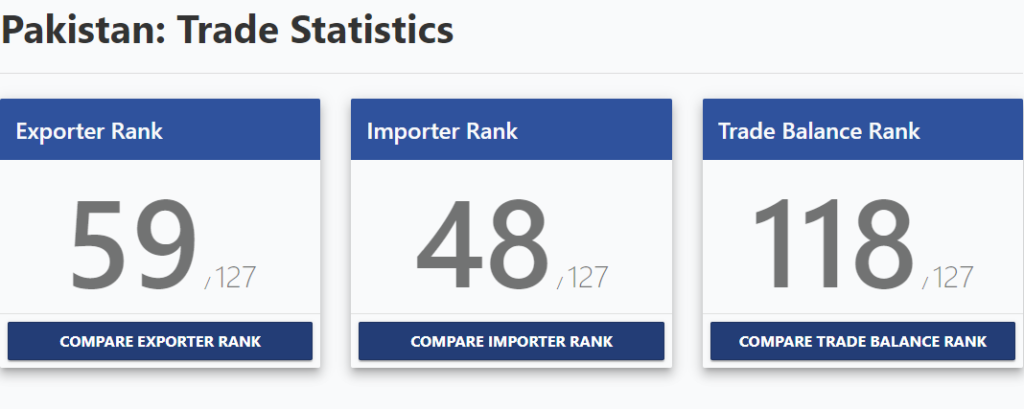The major exports of Pakistan in 2021 include textiles, leather and sports goods, chemicals, carpets, and rugs. Meanwhile, Pakistan also exports significant quantities of rice, sugar, cotton, fish, fruits, and vegetables. The country ranks among Asia’s largest camel market, second-largest apricot and ghee (oil), and third-largest cotton, onion, and milk market. Here’s a look at some exports that help Pakistan stand out in the exporting community across the world
Rice
Mangoes
Oranges
Cotton
Surgical Instruments
Leather Goods
Furniture
Football
Sea Food

The significant fares of Pakistan incorporate materials, calfskin and sports products, synthetic substances, floor coverings, and mats. In the mean time, Pakistan likewise sends out huge amounts of rice, sugar, cotton, fish, natural products, and vegetables.
Fares of labor and products from Pakistan became 13.6% during financial year 2020-21 while imports expanded 20.1%, expressed the Economic Survey of Pakistan 2020-21.
Delivered at a question and answer session by Finance Minister Shaukat Tarin on Thursday, the archive expressed that fares of products alone expanded by 6.5% during July-April of monetary year 2020-21 and added up to $21 billion.
It added that fares of wares remained at $19.7 billion in a similar time of last year.
The public authority projects that fares will hit $25 billion before the finish of current monetary year as fares for a very long time remained at the empowering level of $22.5 billion.
Then again, imports of merchandise during this period heightened to $42.3 billion against $37.3 billion last year, an ascent of 13.5%.
As a result, the import and export imbalance rose from $17.6 billion last year to $21.3 billion in the period under audit, portraying an ascent of 21.3%.
“We need to present new roads of fares with higher worth expansion in the current fare classifications for a superior inflow of dollars,” said Shaukat Tarin while tending to the public interview. “Pakistan needs to look past its customary fare bin and investigate new freedoms.”
He held the view that fares of cruiser parts, drug items and data innovation administrations could be astounding increases to the fare container.
Pakistan’s IT industry is developing at a respectable speed of around half, yet the public authority needs to lift this number to 100% by the following year, he stressed.
“We will offer uncommon motivating forces to such enterprises in a bid to support esteem expansion, which will upgrade trades,” he said. “We will pass on our arrangements to the Ministry of Commerce and request a rundown of motivations to be offered to the enterprises concerned.”
He focused on that the public authority would not permit some other service or office to intercede in this interaction.
Alluding to the flood in imports, Tarin commented that at whatever point development happens, imports rise.
Refering to explanations for the expanding import charge, he said Pakistan was turning into a net shipper of wares like wheat, sugar and beats and the nation was requesting shipments of these items in gigantic amounts.
Since all products were imported at worldwide costs, a Covid-driven spike in worldwide costs was expanding neighborhood rates too, he said.
Costs of raw petroleum flooded by 119% in the worldwide market, notwithstanding, the public authority gave only 32% of the expansion to neighborhood shoppers.
In the mean time, Adviser to Prime Minister on Commerce Abdul Razak Dawood said that esteem expansion was at that point occurring in Pakistan’s biggest fare area, ie material.
Fare incomes of items like home materials and pieces of clothing were climbing, he said.
“Fares of different things like drug items, natural products, vegetables and meat have likewise expanded and one year from now, we will add designing and substance items to our fare crate,” Dawood said.
Reviewing that traditions obligations on 1,600 duty lines were diminished last year, he reported that the public authority was intending to cut traditions obligations on extra tax lines this year.
“Mechanical crude material is getting less expensive because of lessening in obligations,” he said. “We are likewise chipping away at import replacement.”
SMEs
The national government is likewise attempting to incorporate little and medium undertakings (SMEs) in the nation’s fare list.
As per Dawood, not very many neighborhood SMEs had the option to deliver items to different nations and incalculable issues kept on thwarting their development.
Such drives are the need of great importance since Amazon has added Pakistan to its dealers’ rundown, he said.
The money serve said that he expected to achieve a huge change on account of SMEs, which were not invited by banks and monetary foundations for advances.
“There are 6-8 million SMEs in Pakistan and just 1.8 million advances have been endorsed against them,” he said.